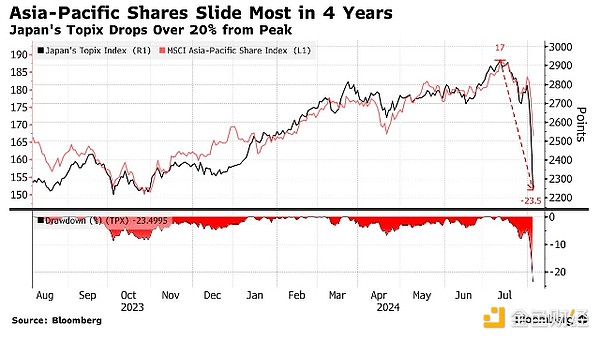Author: Catherine Bosley, Bloomberg; Translated by: Tao Zhu, Jinse Finance
A global stock sell-off intensified on Monday as investors fled to the safety of bonds amid growing concerns that the Federal Reserve was lagging behind in its policy efforts to support a slowing U.S. economy. Japanese stocks tumbled as traders bet on further increases in domestic interest rates.
The Topix and Nikkei both fell more than 13%. Taiwan's benchmark index had its worst day ever, while Asian stock indexes posted their biggest drop in four years, with financial and industrial stocks the biggest drags. European and U.S. stock futures also fell, while the yen rose more than 2.5% against the dollar.
Data released on Friday showed that U.S. nonfarm payrolls posted one of the weakest readings since the pandemic, and the unemployment rate unexpectedly climbed above the Federal Reserve's year-end forecast, triggering a closely watched recession indicator. Concerns about the health of the U.S. economy have driven U.S. Treasury yields lower, while Asian investment-grade dollar bond spreads are expected to post their biggest increase in 22 months.
Charu Chanana, head of FX strategy at Saxo Bank, said: “This is a rather dramatic turnaround and suggests that the recent trend has been largely supported by expectations of a soft U.S. landing. The more the U.S. soft landing assumption is questioned, the more we are likely to see a further correction in equities and strategies funded in low-yielding currencies, as positioning in these currencies is heavily imbalanced.”

Japan's benchmark 10-year bond yield fell to its lowest level since April, having fallen 17 basis points on Monday. Shares of Mitsubishi UFJ Financial Group Inc., the country's largest lender, suffered their biggest intraday drop ever as falling bond yields threatened lending margins.
Since the end of the pandemic, bond traders have repeatedly misjudged the direction of interest rates, sometimes overshooting in both directions. Global bonds have recovered lost ground this year as signs of a deteriorating U.S. economy spurred demand for fixed income.
Falling global stock markets reflect concerns about the economic outlook, geopolitical risks and questions about whether heavy investments in artificial intelligence can live up to the hype surrounding the technology. Goldman Sachs Group Inc. economists raised the odds of a U.S. recession next year to 25% from 15%, though it added there were reasons not to worry.
Sentiment was also weighed by news that Berkshire Hathaway Inc cut its stake in Apple Inc by nearly 50% as part of a massive second-quarter sell-off.
Asian currencies rose, led by the Malaysian ringgit, while the Mexican peso extended its losses as traders continued to unwind emerging market carry trades. A sudden appreciation in funding currencies such as the yen and yuan hurt carry trades, which typically involve traders borrowing money at a lower interest rate to invest in higher-yielding assets.
Elsewhere, oil prices fluctuated near seven-month lows as a broader financial market sell-off offset rising tensions in the Middle East. Israel is preparing for possible attacks from Iran and regional militias in retaliation for the assassination of Hezbollah and Hamas officials. Cryptocurrencies also took a hit on Monday as risk aversion gripped global markets.
With only three Fed meetings left, swaps pricing reflects a growing view that the central bank will need to make unusually large half-point adjustments at a single meeting, or act between scheduled meetings — quickly to boost economic growth.
Still, massive policy moves and aggressive responses could signal an emergency, sparking more unease among traders, with Goldman Sachs raising the odds of a recession next year to 25% from 15%.
“From the Fed’s perspective, this doesn’t mean they will rush into policy decisions, but it should help them take off their rose-tinted glasses when they evaluate policy decisions at their next meeting,” said Charlie Ripley of Allianz Investment Management.
Michael Hartnett of Bank of America Corp. said stocks will likely fall when the Fed first cuts rates because the shift would be accompanied by data suggesting the U.S. economy is headed for a hard landing rather than a soft one.
The Bank of America strategist wrote in a note that since 1970, when the Fed began easing policy, rate cuts in response to economic downturns have had a negative impact on stocks and a positive impact on bonds, citing seven examples to illustrate the pattern. "A very important difference in 2024 will be the extent to which risk assets get ahead of the Fed in cutting rates," Hartnett said.







